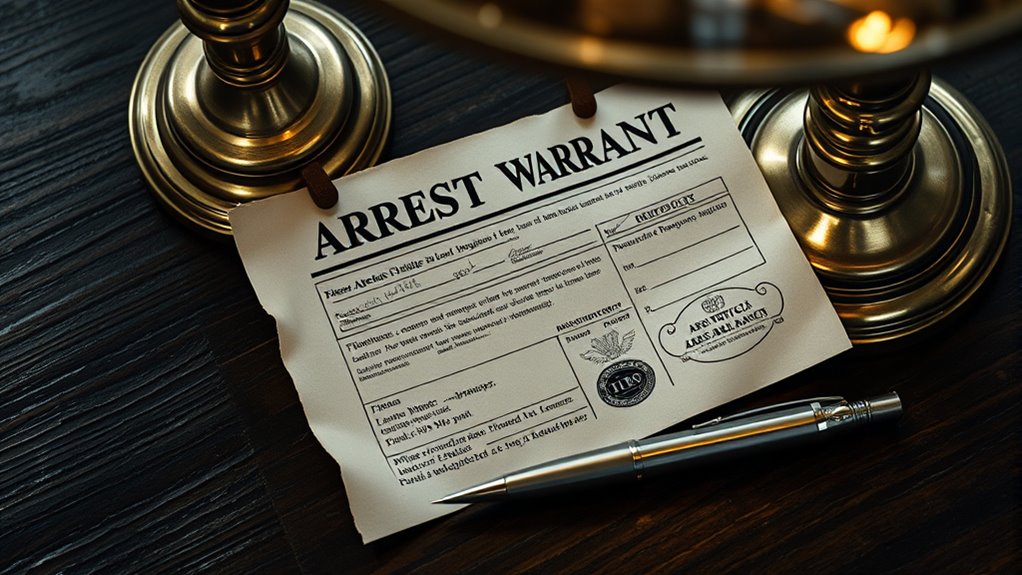An arrest warrant can technically last forever unless it’s officially canceled, executed, or it expires through legal procedures. It stays active until law enforcement or the courts take action to revoke it. In some cases, warrants can remain in effect for years or even decades, especially if unresolved. Factors like jurisdictional rules and probation conditions influence their duration. If you want to understand how these legal details impact you personally, keep exploring further.
Key Takeaways
- An arrest warrant remains active until it is executed, recalled, or legally canceled, potentially lasting indefinitely.
- Warrants can be canceled if the individual voluntarily appears or through court or legal actions.
- Warrant validity often depends on jurisdiction-specific statutes of limitations or policies.
- Unexecuted warrants may become inactive over time, but they can still technically exist.
- Consulting a legal professional helps clarify the current status and any necessary legal steps.

An arrest warrant remains in effect until it is either executed, recalled, or expires, depending on the circumstances and jurisdiction. This means that, technically, a warrant can stay active indefinitely unless specific actions are taken to end it. However, in many cases, warrants aren’t active forever because of legal processes, like warrant cancellations, or because of procedural rules tied to probation periods and other legal considerations.
An arrest warrant stays active until executed, recalled, or expired, but legal processes often lead to cancellations or terminations.
When a warrant isn’t executed within a certain timeframe, law enforcement or the issuing court may take steps to cancel it, especially if the delay is significant or the warrant becomes outdated. Warrant cancellations often happen when the individual appears voluntarily, or if the court determines that the warrant is no longer necessary. Courts may also cancel warrants if the person’s probation periods have ended, or if they’ve served their sentence and there’s no longer a legal reason to keep the warrant in effect.
Probation periods can influence how long an arrest warrant remains active. If you’re on probation and a warrant is issued, the court may set specific conditions that, if fulfilled, can lead to warrant cancellations once those conditions are met. For example, completing probation successfully might result in the court recalling the warrant, assuming there’s no ongoing legal issue. Conversely, if probation is violated, the warrant could stay active longer, or a new warrant could be issued.
It’s important to understand that the duration of a warrant can vary widely based on local laws. Some jurisdictions have statutes of limitations or expiration policies that set time limits on how long a warrant can remain valid. Others may allow warrants to stay active until they are explicitly canceled or executed. If a warrant remains unexecuted for a long period, law enforcement might lose tracking of it, but technically, it can still exist until action is taken to cancel or recall it.
Additionally, legal statutes of limitations may impact how long warrants are enforceable, although they typically do not apply to warrants that are active and unexecuted. In practical terms, if you’re concerned about a warrant, it’s wise to consult a legal professional. They can help determine whether the warrant is still active, whether it could be canceled, and what your options are to resolve the situation. Understanding the rules around warrant cancellations and how probation periods impact warrant duration can help you navigate the legal landscape more effectively and avoid surprises if law enforcement comes knocking.
Frequently Asked Questions
Can an Arrest Warrant Be Extended Indefinitely?
You might wonder if an arrest warrant can be extended indefinitely. Generally, warrant extensions depend on legal deadlines set by the court, but these vary by jurisdiction. Some warrants remain active until the person is arrested or the warrant is canceled, while others may expire if not executed within a certain period. Always check local laws, as warrants can sometimes be extended or renewed, but they don’t usually last forever without action.
What Happens if I Move to a Different State?
Moving to a different state might seem like a simple switch, but it can complicate warrant validity. When you change your residency, your arrest warrant doesn’t disappear, and authorities can still pursue you across state lines. You could face serious scrutiny, even if you’re now miles away. Stay sharp—know that your warrant remains valid, and a new state doesn’t erase or expire it. Always address warrants promptly to avoid avoidable arrests.
Do Warrants Ever Expire Automatically?
Warrant expiration isn’t automatic; it depends on legal deadlines set by the jurisdiction. Some warrants may expire if not executed within a certain period, but many remain active until you’re arrested or the warrant is recalled. You can’t assume a warrant expires on its own. To avoid legal trouble, it’s best to address the warrant promptly and consult with a legal professional to understand specific expiration rules in your area.
How Can I Find Out if I Have an Active Warrant?
Think of your warrant status as a hidden trapdoor—you don’t want to fall through it unexpectedly. To find out if you have an active warrant, you can contact local law enforcement, check online databases, or hire a legal professional. Knowing your warrant procedures helps you avoid legal consequences and surprises. Stay proactive; it’s better to address potential issues before they escalate into serious legal trouble.
Can Law Enforcement Arrest Me Without a New Warrant?
Yes, law enforcement can arrest you without a new warrant if they have probable cause. Warrant exceptions include situations like hot pursuit, imminent danger, or if you’re caught committing a crime. They don’t always need a warrant to make an arrest, especially if circumstances justify it. So, even without an active warrant, you could still be detained if law enforcement believes there’s enough probable cause.
Conclusion
So, now you know arrest warrants aren’t necessarily eternal. They can remain active for years, sometimes forever—like that old, dusty typewriter in the attic, waiting to be used again. If you’re ever unsure or suspect a warrant, it’s best to check with a legal pro. Ignoring it is like ignoring a telegram from the Queen—dangerous and unwise. Stay informed, stay safe, and don’t let that warrant turn into a ghost from your past.









